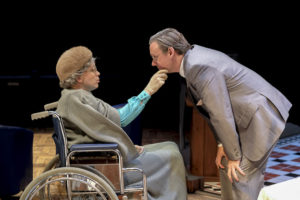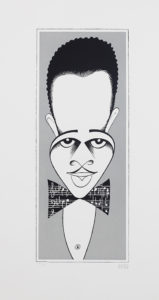 “A healthy male adult bore consumes each year one and a half times his own weight in other people’s patience.”
“A healthy male adult bore consumes each year one and a half times his own weight in other people’s patience.”
John Updike, “Confessions of a Wild Bore”
Terry Teachout on the arts in New York City
 Mrs. T and I recently watched Bill Forsyth’s Local Hero, a comedy of great sweetness and charm. It tells the story of Mac MacIntyre, a high-flying oil-company junior executive from Houston (perfectly played by Peter Riegert) who travels to Ferness, a sleepy, slow-moving coastal village in Scotland, to make a deal that will transform the place beyond recognition, finds to his surprise that he loves the town exactly as it is, then returns to Houston and realizes that the brief but idyllic time he spent in Ferness has caused his everyday life to lose its savor.
Mrs. T and I recently watched Bill Forsyth’s Local Hero, a comedy of great sweetness and charm. It tells the story of Mac MacIntyre, a high-flying oil-company junior executive from Houston (perfectly played by Peter Riegert) who travels to Ferness, a sleepy, slow-moving coastal village in Scotland, to make a deal that will transform the place beyond recognition, finds to his surprise that he loves the town exactly as it is, then returns to Houston and realizes that the brief but idyllic time he spent in Ferness has caused his everyday life to lose its savor.
You’ve seen that plot before, of course—the same thing, more or less, happens in Doc Hollywood, another of my favorite movies—but part of what makes Local Hero so good is that it doesn’t let MacIntyre off the hook. We know at film’s end that he has seen paradise but could not walk through the door, and that he will spend the rest of his life rueing his inability to turn his back on an existence that no longer has anything to offer him but loneliness.
Might it be that I’m stuck on a similar hook? I moved to New York at the age of twenty-nine, having grown up in a small town and lived for a time on the outskirts of a medium-sized city, and I’ve been here ever since. Once it excited me, then it started irritating me, but at no point along the way did I ever give serious thought to leaving. To be sure, I’ve entertained myself on multiple occasions with the idle fantasy of pulling up stakes, but I’m far too tightly tied to my job, which requires me to see one or two shows on or near Broadway most weeks save in the summer, when I go to shows in other parts of the country.
 It’s a treadmill of sorts, but a benign and stimulating one, and my employers give me a safety valve by letting me go elsewhere from time to time to work on the plays and opera libretti that I started writing a few years ago. What with that freedom, the extended reviewing trips to Florida that Mrs. T and I make every winter, and the commonplace comforts of the rural farmhouse in Connecticut where we spend much of our time when I’m not on the aisle in Manhattan, it would be churlish for me to complain about the shape that my life has taken in middle age. Nobody has to tell me that most people have it a whole lot harder.
It’s a treadmill of sorts, but a benign and stimulating one, and my employers give me a safety valve by letting me go elsewhere from time to time to work on the plays and opera libretti that I started writing a few years ago. What with that freedom, the extended reviewing trips to Florida that Mrs. T and I make every winter, and the commonplace comforts of the rural farmhouse in Connecticut where we spend much of our time when I’m not on the aisle in Manhattan, it would be churlish for me to complain about the shape that my life has taken in middle age. Nobody has to tell me that most people have it a whole lot harder.
Alas, one of the legs of my satisfying existence has lately been knocked out from under me. Mrs. T’s doctors ordered her last fall to hang up her traveling shoes until further notice, and I followed suit because…well, because I no longer much care to be where she isn’t. As a result, we spent the first month of 2018 not on Florida’s Sanibel Island, our wintertime home away from home for the past seven years, but in New York and Connecticut. Again, it could have been worse—the weather up north was surprisingly mild—but it turns out that I’ve grown accustomed to sunshine in January, and losing it got me down.
 My unexpected stint in Houston staging Satchmo at the Waldorf at the Alley Theatre was a wonderfully fulfilling distraction, but no sooner did I come back home than the snow started to fall and I was thereby plunged into a bit more reality than I was quite ready to stomach. Without going into any great detail, suffice it to say that the past couple of months have been rife with widely varied difficulties, enough so to occasionally put to the test my ability to cope.
My unexpected stint in Houston staging Satchmo at the Waldorf at the Alley Theatre was a wonderfully fulfilling distraction, but no sooner did I come back home than the snow started to fall and I was thereby plunged into a bit more reality than I was quite ready to stomach. Without going into any great detail, suffice it to say that the past couple of months have been rife with widely varied difficulties, enough so to occasionally put to the test my ability to cope.
Nothing finite is intolerable, and under normal circumstances I’d now be packing my bags for a trip to Chicago or Wisconsin or Oregon or Niagara-on-the-Lake, secure in the knowledge that a change of scene usually leads to a change of mind. This summer, though, Mrs. T and I won’t be visiting any theaters that are much more than three hours from New York by car, and we’ll be keeping our overnight stays away from home to the barest possible minimum.
If I sound like I’m complaining, then I’m giving the wrong impression. The fact is that I’ve done rather too much traveling in the past few years, and I’ve had to do too much of it without Mrs. T. But we, too, have our Fernesses, and both of us miss them. “I promise you that we’ll be back here again,” I told her at the end of our first visit to Sanibel Island. Sure enough, we went back a year later, and stayed even longer. I’ve kept that promise ever since—until now.
 I don’t know when Mrs. T and I will be back in Sanibel again, or when we’ll ride the Coast Starlight, spend a night in Seth Peterson Cottage, or set sail on Schooner Grace Bailey, to mention only three of the most exciting things we’ve done together since we got married a decade ago. It may well be that our days of far-flung adventure are over, and that we’ll henceforth have to settle for less ambitious pleasures. It could also be that I’ll spend the rest of my life shuttling between Upper Manhattan and rural Connecticut, never again to shut off my phone (if people still do that) and load up the moving van.
I don’t know when Mrs. T and I will be back in Sanibel again, or when we’ll ride the Coast Starlight, spend a night in Seth Peterson Cottage, or set sail on Schooner Grace Bailey, to mention only three of the most exciting things we’ve done together since we got married a decade ago. It may well be that our days of far-flung adventure are over, and that we’ll henceforth have to settle for less ambitious pleasures. It could also be that I’ll spend the rest of my life shuttling between Upper Manhattan and rural Connecticut, never again to shut off my phone (if people still do that) and load up the moving van.
And would that really matter if it came to pass? I don’t think so. What does matter—more than anything—is that wherever I end up spending the rest of my life, I won’t be spending it alone. Unlike Mac MacIntyre, who missed his chance to be happy, I seized the greater hope and walked through the door, never doubting for a moment that I was doing the right thing.
* * *
The last scene of Local Hero:
In today’s Wall Street Journal I review the U.S. premiere of Alan Ayckbourn’s A Brief History of Women. Here’s an excerpt.
* * *
Alan Ayckbourn’s 81st full-length play recently opened off Broadway. His 82nd full-length play will open in England in September. Given that he is 79 years old and shows no signs of slowing down, I assume that he has at least another dozen or so in him—and that they’ll all be good….
Scarborough’s Stephen Joseph Theatre, which Mr. Ayckbourn ran from 1972 to 2009 and where he continues to stage his own work, remounts one or two of his productions every couple of seasons as part of 59E59 Theatres’ annual “Brits Off Broadway” festival. This time it’s Play No. 81, “A Brief History of Women,” in which he uses the seemingly dull life of a fellow who started out as a footman and ended up as a hotelier as a lens through which we view the changing place of women in 20th-century English society.
 As usual with Mr. Ayckbourn, “A Brief History of Women” arises from an ingenious structural premise: All four scenes take place on the ground floor of the same country house at 20-year intervals, the first in 1925 and the last in 1985. In the first scene, Anthony Spates (played by Antony Eden), the only character who appears throughout the play, is a part-time servant to the owners of Kirkbridge Manor, an aristocratic couple who are on the outs. In 1945 the manor has been turned into a prep school where Anthony teaches, contriving to get himself fired for engaging in hanky-panky with a colleague. By 1965 it’s become an arts center that he runs—not very well, one gathers, though he does find a wife there—and in the last part, the great house has been done over as a hotel of which Anthony is the part-time manager and where he meets a 97-year-old guest who once upon a time was the unhappy lady of Kirkbridge Manor.
As usual with Mr. Ayckbourn, “A Brief History of Women” arises from an ingenious structural premise: All four scenes take place on the ground floor of the same country house at 20-year intervals, the first in 1925 and the last in 1985. In the first scene, Anthony Spates (played by Antony Eden), the only character who appears throughout the play, is a part-time servant to the owners of Kirkbridge Manor, an aristocratic couple who are on the outs. In 1945 the manor has been turned into a prep school where Anthony teaches, contriving to get himself fired for engaging in hanky-panky with a colleague. By 1965 it’s become an arts center that he runs—not very well, one gathers, though he does find a wife there—and in the last part, the great house has been done over as a hotel of which Anthony is the part-time manager and where he meets a 97-year-old guest who once upon a time was the unhappy lady of Kirkbridge Manor.
Such is the stuff miniseries are made of, but Mr. Ayckbourn doesn’t think that way. Instead, he compresses each “episode” of his complex plot into a single scene that plays out in something close to real time, thereby intensifying its emotional impact. A few of the plot lines are explicitly farce-flavored, but shadows of melancholy are rarely far from view…
* * *
Read the whole thing here.
A featurette about the original Stephen Joseph Theatre production of A Brief History of Women:
 Melvin Purvis, who led the team of FBI agents that shot and killed John Dillinger in 1934, appears as the mystery guest on To Tell the Truth, hosted by Bud Collyer. This episode was originally telecast by CBS on September 17, 1957. The panelists were Polly Bergen, Ralph Bellamy, Kitty Carlisle, and Hy Gardner:
Melvin Purvis, who led the team of FBI agents that shot and killed John Dillinger in 1934, appears as the mystery guest on To Tell the Truth, hosted by Bud Collyer. This episode was originally telecast by CBS on September 17, 1957. The panelists were Polly Bergen, Ralph Bellamy, Kitty Carlisle, and Hy Gardner:
(This is the latest in a series of arts- and history-related videos that appear in this space each Monday, Wednesday, and Friday)
I belong to the first generation of biographers whose work was shaped by the invention of the personal computer. Not only did I write The Skeptic: A Life of H.L. Mencken on a computer, but I bought my first laptop in order to transcribe material from the Mencken Collection, which is housed in Baltimore’s Enoch Pratt Free Library. So far as I know, I was the first person ever to bring a laptop into the Mencken Room, whose contents include, among other fascinating things, the ancient Corona portable typewriter on which Mencken banged out most of his books and other published writings. I like to think that he would have appreciated this fact, but I wouldn’t bet on it….
Read the whole thing here.
“Shallow men believe in luck, believe in circumstances: It was somebody’s name, or he happened to be there at the time, or, it was so then, and another day it would have been otherwise. Strong men believe in cause and effect.”
Ralph Waldo Emerson, The Conduct of Life
 I’ve been so preoccupied with the demands of my day job of late that I’m only just getting around to announcing the arrival of the latest addition to the Teachout Museum, a pencil-signed 1992 lithograph of Duke Ellington drawn by Al Hirschfeld.
I’ve been so preoccupied with the demands of my day job of late that I’m only just getting around to announcing the arrival of the latest addition to the Teachout Museum, a pencil-signed 1992 lithograph of Duke Ellington drawn by Al Hirschfeld.
I am, needless to say, a great admirer of Hirschfeld, whose 1990 lithograph of Louis Armstrong has been on display in our New York apartment ever since Mrs. T and I bought it in 2014, a month after Satchmo at the Waldorf opened off Broadway. Just as I made a special point of reproducing “Satchmo!” in Pops, my Armstrong biography, so can this caricature—or, rather, an earlier version of it, about which more in a moment—be found in Duke: A Life of Duke Ellington. It stands to reason, then, that I also hoped someday to acquire a copy of “Duke Ellington,” not merely for sentimental reasons but because I believe it to be an exceptionally choice example of Hirschfeld’s work, a portrait as elegant and sly as Ellington himself.
Thereby hangs a tale, one that I told rather too briefly in Duke. It seems that Hirschfeld’s original caricature of Ellington, which now belongs to the National Portrait Gallery and on which he based this lithograph, was itself a new version of a much older drawing now known only to Ellington scholars, one that he had made in 1931 at the behest of Irving Mills, his manager.
As I explained in Duke:
Mills commissioned the jazz-loving theatrical cartoonist to draw a sketch that could be published by newspapers whose editors were unwilling to run photos of a black person—even one who, like Ellington, was an international celebrity. This witty (and respectful) art-deco caricature was included in one of the advertising manuals sent out by the Mills office.
 To read that manual today is—to put it very, very mildly—an eye-opening experience, especially if you’re too young to recall the days when racial segregation was taken for granted throughout much of America. The anonymous author carefully explains to potential promoters that the Ellington band is “an attraction which may be just a little different than those you have handled previously. You may encounter some difficulty in planting photographs in newspapers, for example….Little objection ever has been voiced by amusement editors or radio editors to the use of this caricature in their columns. Many of the greatest metropolitan dailies in the country have used it.” And Mills’ subterfuge worked like a charm: Hirschfeld’s drawing appeared in papers all over the country, the Deep South included.
To read that manual today is—to put it very, very mildly—an eye-opening experience, especially if you’re too young to recall the days when racial segregation was taken for granted throughout much of America. The anonymous author carefully explains to potential promoters that the Ellington band is “an attraction which may be just a little different than those you have handled previously. You may encounter some difficulty in planting photographs in newspapers, for example….Little objection ever has been voiced by amusement editors or radio editors to the use of this caricature in their columns. Many of the greatest metropolitan dailies in the country have used it.” And Mills’ subterfuge worked like a charm: Hirschfeld’s drawing appeared in papers all over the country, the Deep South included.
I have no trouble understanding why Hirschfeld chose to redraw his very first Ellington caricature six decades after the fact (the original by then having long since vanished) and turn it into a limited-edition lithograph. To be sure, his portraits of Ellington in middle and old age are both charming and characteristic, but this one, made right around the time that he was turning out such early masterpieces as “Creole Rhapsody,” “Mood Indigo,” and “Rockin’ in Rhythm,” is something more than that. It is, above all, a portrait of the artist as a young man, pensive and—at least to my biographer’s eye—guarded, a man who poured his innermost feelings into his music but otherwise preferred to keep them hidden from the world.
The Ellington of this caricature is the same one whose complex personality I endeavored to suggest in my biography. It pleases me greatly that so handsome and revealing a work of art will now hang in the room where I wrote most of Duke.
* * *
To read more about Al Hirschfeld’s 1931 and 1992 caricatures of Duke Ellington, go here.
| M | T | W | T | F | S | S |
|---|---|---|---|---|---|---|
| 1 | 2 | 3 | 4 | 5 | 6 | 7 |
| 8 | 9 | 10 | 11 | 12 | 13 | 14 |
| 15 | 16 | 17 | 18 | 19 | 20 | 21 |
| 22 | 23 | 24 | 25 | 26 | 27 | 28 |
| 29 | 30 | |||||
An ArtsJournal Blog